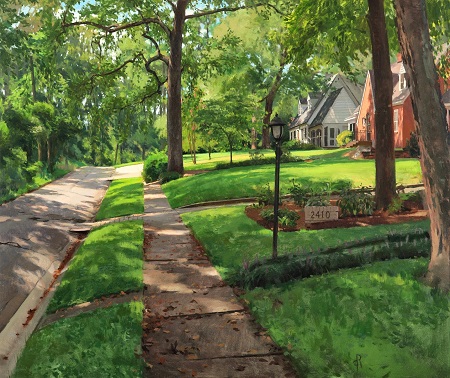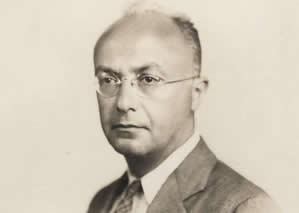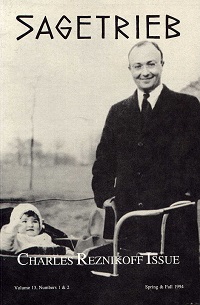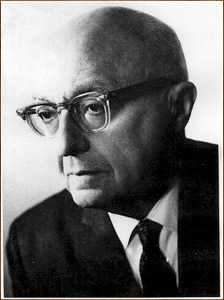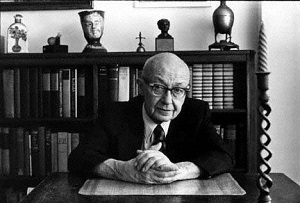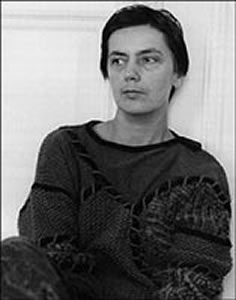De Amerikaanse dichter Charles Reznikoff werd op 30 augustus 1894 in New York geboren. Zie ook mijn blog van 30 augustus 2009.
Notes on the Spring Holidays, III, [Hanukkah]
III
Hanukkah
In a world where each man must be of use
and each thing useful, the rebellious Jews
light not one light but eight—
not to see by but to look at.
Meditations on the Fall and Winter Holidays
IV
Hanukkah
The swollen dead fish float on the water;
the dead birds lie in the dust trampled to feathers;
the lights have been out a long time and the quick gentle hands that lit them —
rosy in the yellow tapers’ glow–
have long ago become merely nails and little bones,
and of the mouths that said the blessing and the minds that thought it
only teeth are left and skulls, shards of skulls.
By all means, then, let us have psalms
and days of dedication anew to the old causes.
Penniless, penniless, I have come with less and still less
to this place of my need and the lack of this hour.
That was a comforting word the prophet spoke:
Not by might nor by power but by My spirit, said the Lord;
comforting, indeed, for those who have neither might nor power–
for a blade of grass, for a reed.
The miracle, of course, was not that the oil for the sacred light–
in a little cruse–lasted as long as they say;
but that the courage of the Maccabees lasted to this day:
let that nourish my flickering spirit.
Go swiftly in your chariot, my fellow Jew,
you who are blessed with horses;
and I will follow as best I can afoot,
bringing with me perhaps a word or two.
Speak your learned and witty discourses
and I will utter my word or two–
not by might not by power
but by Your Spirit, Lord.

Charles Reznikoff (30 augustus 1894 – 22 januari 1976)
De Chinees-Franse dichter, schrijver en vertaler François Cheng werd geboren op 30 augustus 1929 in Nanchang in China. Zie ook mijn blog van 30 augustus 2008 en ook mijn blog van 30 augustus 2009.
À L’ORIENT DE TOUT
L’aigle invisible est en vous
Rochers surgis de nos rêves
En nous la flamme
En nous le vol
En nous la nuit fulgurantye
Que nous ignorions
Rochers surgis de nos rêves
L’invisible aigle est en vous
Embrassant Yng
Endossant Yang
Frayant en nous la voie sûre
Que nous ignorions
Sol craquelé
Ciel constellé
En nous votre élan charnel
À l’aube de toute route
Vous dressez vos corps ailés
Parfois nos mains calleuses
Brisant les frimas figés
Un ange renaît sourire
Miracle
Lorsque par-dessus l’abîme qui sépare
Resplendit l’étoile
de la prime étincelle
Lorsque par-delà la nuit des temps morts
Le cauchemar éclôt
en rose-thé du jour
Lorsque jamais entendus les appels vains
Se transmuent enfin
en murmures ininterrompus
Miracle cette vie qui s’offre
Tout de consentement et d’entendement
entre les mains entre les lèvres
Laisse-toi traverser par le souffle inouï
par le pur souffle du oui !

François Cheng (Nanchang, 30 augustus 1929)
De Tsjechische dichter Jiří Orten (eig. Jiří Ohrenstein) werd geboren op 30 augustus 1919 bij Kutná Hora. Zie ook mijn blog van 30 augustus 2007 en ook mijn blog van 30 augustus 2008 en ook mijn blog van 30 augustus 2009.
This is a Glorious Tale
With a pocket knife
the world had been cut.
And much blood has been shed. Poems
and nights. The wind played along, but
didn’t finish—For women,
it was a matter of life,
but for us a matter of death, not only
our lips thirsted after
the spring. Even our voice!
Voice, dried out and blood-stained,
go to the home
which cliffs and greenery
perceive as lost—if it’s found for them, what
a time that will be!
it will push through with its prow
everything rotting in us now—
Sugar Is Dissolving
Sugar is dissolving and sweetness is seeping out,
breakfast time.
Put on sandals, look around, to see if there’s still
fog, if it didn’t want to lift, if it will
be a nice day or will drizzle from
sky over hill.
Your head is clear and you look at things as if for
the first time,
you aren’t touching a thing in yourself from
the past, oh, take now the words you are whispering,
lighter than dew, and weigh them out exactly
against tears and blood.
A walk awaits you, before waters are muddied, before your
world turns mud.
Look around carefully, see how the earth is turning, how
it floats through the universe, look, focus your eyes, how
close to the circle made by the dead you are,
the dot in the center.
Vertaald door Lyn Coffin and Zdenka Brodska

Jiří Orten (30 augustus 1919 – 1 september 1941)
De Duitse schrijfster Gisela von Arnim werd geboren op 30 augustus 1827 in Berlijn geboren. Zie ook mijn blog van 30 augustus 2008 en ook mijn blog van 30 augustus 2009.
Uit: Das Leben der Hochgräfin Gritta von Rattenzuhausbeiuns
„Dann sah es wohl von weitem aus, wenn sich die Abendsonne in einem Schloßfenster spiegelte, als leuchte sie den alten Steinen – denn dafür hielt man die Ratten in der Ferne – zum Abendtanz, und man hatte Angst, sie würden einmal ganz davon laufen und den Besitzer ohne Besitz lassen. Es waren auch Türme an den Ecken, aber zerfallen, außer einem, der noch zierlich an das alte Nest geklebt war; aber aus den gotischen Rosen und Linien der Verzierungen wuchs Gras und Moos.
Dies war das Schloß von einem alten Grafen Rattenzuhausbeiuns, der mit einem Töchterchen dort wohnte. Ein schmaler Steg, wie man ihn sonst über die Bächlein legt, führte von einem vorragenden Fels aus, grade über den Talabgrund, vor die kleine Holztür des Schlosses, der ein Holunderbaum mit seinen Blüten zur Seite nickte. Der Wurm hatte viele Löcher hinein gebohrt, und die Spinnen viele Decken darüber gewebt. – Heute tönte schon das fleißige Rädchen Grittas herab, wie es schnurrte. Es kam ein Steingang, spitz und dunkel zugewölbt, mit verschiednen Löchern für Ratten und Mäuse; dann ein gewundnes Treppchen hinauf. Hier saß die kleine Hochgräfin Gritta, der emsig das Rädchen den feinen Faden aus den Fingern zog, während sie träumerisch zuschaute, und hier war am Ende des Ganges eins der drei Fenster des Schlosses zu finden, das rund und halb voll grüner Scheiben, halb mit dem halben Leibe des Ritters St. Georg, im blauen und roten Gewand, und dem des Drachen gefüllt war; auf dem Fenster stand ein Krügelchen mit Nelkenschößlingen, und die Sonne fiel durch den blau und roten St. Georg auf den hochgräflichen Goldblondkopf und spielte in wundermilden Farbentönen auf dem Steinboden, ihn erwärmend, obwohl es noch ziemlich kalt im Gang war.“

Gisela von Arnim (30 augustus 1827 – 4 april 1889)
Cover luisterboek
De Duitstalige, Tsjechische schrijfster Libuše Moníková werd geboren op 30 augustus 1945 in Praag. Zie ook mijn blog van 30 augustus 2007 en ook mijn blog van 30 augustus 2008 en ook mijn blog van 30 augustus 2009.
Uit: Verklärte Nacht
„Malovanka, Marijänka, Drinopol — die dritte Haltestelle hinter Pohorelec, früher Station »Denkmal
des Nationalen Schrifttums«; die Namen wechseln schnell seit einiger Zeit. Das Kloster Strahov
wurde im Rahmen der Restitution den Prämonstratensern zurückgegeben, wie lange die Manuskripte
des Nationalen Schrifttums dort noch aufbewahrt werden, ist unklar. Der alte Ortsname Pohorelec — Brandstätte, ist geblieben, als Erinnerung an die häufigen Feuersbrünste in dieser Vorstadt von Hradcany. Ich steige aus. Die Zweiundzwanzig fährt weiter, am Gasthaus »Zur Kastanie« vorbei, dem Gründungsort der Sozialdemokratischen Partei, dann auf die Straße der Pioniere zu, mit dem ältesten Mönchskloster Böhmens und der Kirche der Heiligen Margarethe in Richtung Bilá Hora, Weißer Berg, wo in der Schlacht von 1620 der böhmische protestantische Adel vernichtet wurde. Endstation.
Nach dem November 1989 wurde die Straße der Pioniere in Patockova umbenannt, zur Erinnerung
an den Philosophen Jan Patocka, Mitbegründer der Charta 77, der mit siebzig Jahren nach einem elfstündigen Verhör durch die StB, die Geheime Staatssicherheit, an einem Hirnschlag starb. Bei seinem Begräbnis auf dem St. Margarethener Friedhof kreiste knatternd ein Polizeihubschrauber
über den Trauernden, so daß die Sprecher nicht zu hören waren. Jeder, der sich dem Friedhof
näherte, wurde gefilmt, wer eintreten wollte, mußte sich ausweisen und wurde registriert.“

Libuše Moníková (30 augustus 1945 – 12 januari 1998)
De Engelse schrijfster Mary Wollstonecraft Shelley werd geboren op 30 augustus 1797. Zie ook mijn blog van 30 augustus 2006 en ook mijn blog van 30 augustus 2007 en ook mijn blog van 30 augustus 2009.
Uit: Letters
“[MWS to John Howard Payne, Sept. 27, 1825]
. . . I have also been for 10 days to Windsor –where I rambled to my old haunts. Windsor–Eton &c is the only spot of English ground for which I have an affection. We were delighted each morning too by hearing the King’s band practise for an hour & a half–the finest band in the world perhaps consisting of 44 wind instruments, whose effect is so much finer than those scraping strings–In sacred pieces they rose to the majesty of an organ–in lighter airs their delicate execution seemed the work of fayry powers. The grand disappointment was that I could not obtai[n] a sight of my liege Lord his Sacred Majesty–It was too provoking–I prepared my best curls & smiles & curtsey & walked up Each day to the castle with my companion vainly–The servants in waiting began to know us & one old fat footman commiserated our fate mightily when we asked for the last time whether his Majesty was expected & told him that it was our last chance–“I am quite sorry, ladies–I am sure his majesty would have been glad to see you–he is always glad to see & be seen by ladies.”–What a flattering prospect–the while thus we fished the object of our angling was seated calmly in a boat fishing for less fish on Virginia Water.”

Mary Shelley (30 augustus 1797 – 1 februari 1851)
De Duitse dichter, schrijver en verzetsstrijder Adam Kuckhoff werd geboren op 30 augustus 1887 in Aken. Zie ook mijn blog van 30 augustus 2008
Abschiedsgedicht
Andern hab ich manchen Vers geschrieben,
Dir nur hier und da ein kleines Wort.
Zeugt das nicht von kleinerer Kraft im Lieben?
Geh ich nicht als Schuldner von dir fort?
O Geliebte, ungemessen
War die Liebe, die uns zwei verband.
Über ihr hab ich das Wort – vergessen
Weil ein jeder Tag uns in ihr fand.
Denkst Du an das Blut in Deinen Lungen?
Sprichst Du von der Luft, die Dich umgibt?
Nein, ich habe Dich nicht besungen,
nur geliebt.

Adam Kuckhoff (30 augustus 1887 – 5 augustus 1943)
